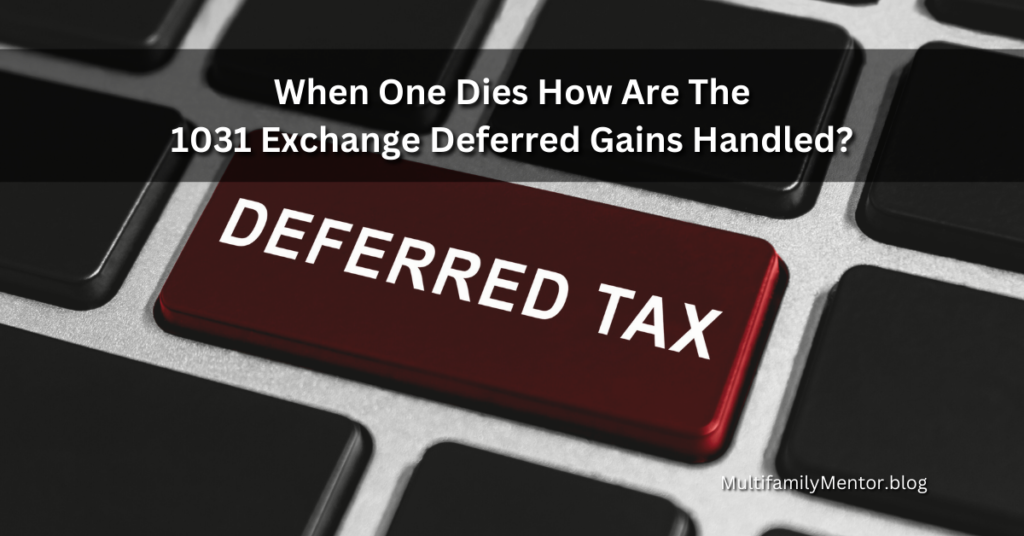Learn how deferred gains from a 1031 exchange are handled upon the death of an investor. Make sure your assets and tax reductions outlive you. Find out more about the complexities of stepped-up basis, estate taxes, and other topics.
Executive Summary
We shall examine the complex mechanics of how 1031 exchange deferred gains are handled in cases of death in this post. Real estate investors who use the 1031 exchange, commonly referred to as a like-kind exchange, can postpone paying capital gains taxes by reinvesting the sale proceeds of one property into another that is identical. However, the issue of how the delayed gains would be handled when an investor passes away emerges. We will look at the ramifications and different circumstances, offering helpful advice to assist you navigate this challenging area of estate planning.
Introduction
Real estate investors frequently use the 1031 exchange to postpone paying capital gains taxes on property sales. Investors can use it to reinvest the money in a property of a similar type, protecting their investment and delaying tax obligations. When the investor dies, though, the situation gets more challenging. In this post, we'll examine the many circumstances and rules governing how deferred profits are handled in the case of death.
Stepped-Up Basis Definition
- Stepped-Up Basis is the process of adjusting an asset's worth after the owner's passing. It is extremely important in assessing the tax repercussions for the heirs or beneficiaries of a 1031 exchange.
- The heirs can inherit the property at its fair market worth as of the owner's passing rather than the initial purchase price thanks to the stepped-up basis.
- The new basis is “stepped up” to the fair market value, essentially eliminating the delayed gains from the 1031 exchange.
Considerations Regarding Estate Taxes
Concerns about estate taxes are significant when it comes to transferring money and assets. Effective estate planning requires an understanding of how they relate to the delayed gains from a 1031 exchange.
- If deferred gains have not been reduced by a stepped-up basis, they are often subject to estate taxes.
- The taxable estate includes the value of the deferred profits, which could result in higher tax obligations for the heirs.
Qualified Intermediary
A qualified intermediary (QI) is essential in the facilitation of 1031 transactions. When handling deferred gains following the investor's passing, the QI's role and obligations could change.
- In order to ensure the correct administration of the delayed gains, the QI's obligations may also extend to the heirs or beneficiaries of the dead investor.
- To negotiate the intricacies and regulatory requirements, it is crucial to have a trained intermediary with experience in post-death 1031 exchange transactions.
Timelines and Deadlines
Deadlines and time constraints are essential components of the 1031 exchange process. Understanding how these timescales are impacted and whether extensions or modifications are available after the death of an investor is crucial.
- The investor's passing could affect how quickly replacement properties are found and the swap is finished.
- Extensions might be allowed in some circumstances, but it's important to speak with a lawyer and a tax expert to be sure you're following the rules.
Trusts and Estates 1031 Exchange
Trusts and estate planning techniques are frequently used by investors to safeguard and pass on their assets. It is essential to comprehend the consequences and factors unique to trusts and estates when a 1031 exchange is involved.
- Trustees might be required to guide the beneficiaries through a 1031 exchange's obligations.
- To guarantee a smooth transition and conformity with tax requirements, proper paperwork and coordination between the trust, trustee, and skilled intermediary are crucial.
Conclusion
A thorough understanding of tax regulations, estate planning, and the relevant conditions is necessary to navigate the handling of 1031 exchange deferred gains upon the death of an investor. Individuals can make well-informed decisions and take the required actions to successfully handle these deferred gains by taking into account the ideas of stepped-up basis, estate tax concerns, the function of a qualified intermediary, timeframes and deadlines, and the impact on trusts and estates.

